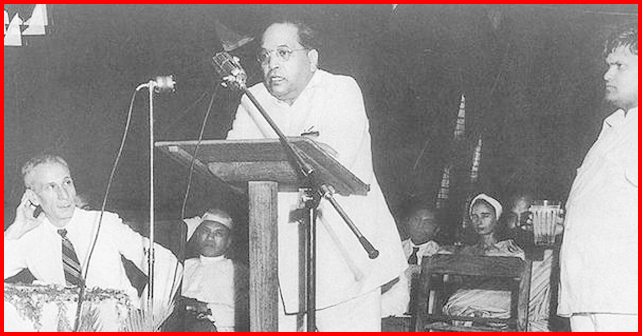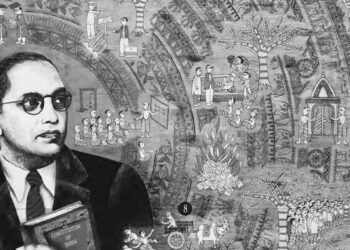“One must therefore define what he understands by religion in order to avoid argument being directed at cross purposes. This is particularly necessary in the case of Religion for the reason that there is no agreement as to its exact definition.”
What is the philosophy of Hinduism? This is a question which arises in its logical sequence. But apart from its logical sequence its importance is such that it can never be omitted from consideration. Without it no one can understand the aims and ideals of Hinduism. It is obvious that such a study must be preceded by a certain amount of what may be called clearing of the ground and defining of the terms involved. At the outset it may be asked what does this proposed title comprehend? Is this title of the Philosophy of Hinduism of the same nature as that of the Philosophy of Religion? I wish I could commit myself one way or the other on this point. Indeed I cannot. I have read a good deal on the subject, but I confess I have not got a clear idea of what is meant by Philosophy of Religion. This is probably due to two facts. In the first place while religion is something definite, there is nothing definite as to what is to be included in the term philosophy In the second place Philosophy and Religion have been adversaries if not actual antagonists as may be seen from the story of the philosopher and the theologian. According to the story, the two were engaged in disputation and the theologian accused the philosopher that he was “like a blind man in a dark room, looking for a black cat which was not there”. In reply the philosopher charged the theologian saying that “he was like a blind man in the dark room, looking for a black cat which was not there but he declared to have found there” Perhaps it is the unhappy choice of the title — Philosophy of Religion—which is responsible for causing confusion in the matter of the exact definition of its field. The nearest approach to an intelligible statement as to the exact subject matter of Philosophy of Religion I find in Prof. Pringle-Pattison who observes :—
“A few words may be useful at the outset as an indication of what we commonly mean by the Philosophy of Religion. Philosophy was described long ago by Plato as the synoptic view of things. That is to say, it is the attempt to see things together – to keep all the main features of the world in view, and to grasp them in their relation to one another as parts of one whole. Only thus can we acquire a sense of proportion and estimate aright the significance of any particular range of facts for our ultimate conclusions about the nature of the world-process and the world ground. Accordingly, the philosophy of any particular department of experience, the Philosophy of Religion, the Philosophy of Art, the Philosophy of Law, is to be taken as meaning an analysis and interpretation of the experience in question in its bearing upon our view of man and the world in which he lives. And when the facts upon which we concentrate are so universal, and in their nature so remarkable, as those disclosed by the history of religion—the philosophy of man’s religious experience—cannot but exercise a determining influence upon our general philosophical conclusions. In fact with many writers the particular discussion tends to merge in the more general.”
“The facts with which a philosophy of religion has to deal are supplied by the history of religion, in the most comprehensive sense of that term. As Tiele puts it, “all religions of the civilized and uncivilised world, dead and living”, is a ‘historical and psychological phenomenon’ in all its manifestations. These facts, it should be noted, constitute the data of the philosophy of religion; they do not themselves constitute a ‘philosophy’ or, in Tiele’s use of the term, a ‘science’ of religion. ‘If’, he says, ‘I have minutely described all the religions in existence, their doctrines, myths and customs, the observances they inculcate and the organization of their adherents, tracing the different religions from their origin to their bloom and decay, I have merely collected the materials with which the science of religion works’. ‘The historical record, however complete, is not enough; pure history is not philosophy. To achieve a philosophy of religion we should be able to discover in the varied manifestations a common principle to whose roots in human nature we can point, whose evolution we can trace by intelligible stages from lower to higher and more adequate forms, as well as its intimate relations with the other main factors in human civilization”. If this is Philosophy of Religion it appears to me that it is merely a different name for that department of study which is called comparative religion with the added aim of discovering a common principle in the varied manifestations of religion. Whatever be the scope and value of such a study, I am using the title Philosophy of Religion to denote something quite different from the sense and aim given to it by Prof. Pringle-Pattison. I am using the word Philosophy in its original sense which was two-fold. It meant teachings as it did when people spoke of the philosophy of Socrates or the philosophy of Plato. In another sense it meant critical reason used in passing judgments upon things and events. Proceeding on this basis Philosophy of Religion is to me not a merely descriptive science. I regard it as being both descriptive as well as normative. In so far as it deals with the teachings of a Religion, Philosophy of Religion becomes a descriptive science. In so far as it involves the use of critical reason for passing judgment on those teachings, the Philosophy of Religion becomes a normative science. From this it will be clear what I shall be concerned within this study of the Philosophy of Hinduism. To be explicit I shall be putting Hinduism on its trial to assess its worth as away of life. Here is one part of the ground cleared. There remains another part to be cleared. That concerns the ascertainment of the factors concerned and the definitions of the terms I shall be using. A study of the Philosophy of Religion it seems to me involves the determination of three dimensions. I call them dimensions because they are like the unknown quantities contained as factors in a product. One must ascertain and define these dimensions of the Philosophy of Religion if an examination of it is to be fruitful. Of the three dimensions, Religion is the first. One must therefore define what he understands by religion in order to avoid argument being directed at cross purposes. This is particularly necessary in the case of Religion for the reason that there is no agreement as to its exact definition. This is no place to enter upon an elaborate consideration of this question. I will therefore content myself by stating the meaning in which I am using the word in the discussion which follows. I am using the word Religion to mean Theology. This will perhaps be insufficient for the purposes of definition. For there are different kinds of Theologies and I must particularize which one I mean. Historically there have been two Theologies spoken of from ancient times. Mythical theology and Civil theology. The Greeks who distinguished them gave each a definite content. By Mythical theology they meant the tales of gods and their doings told in or implied by current imaginative literature. Civil theology according to them consisted of the knowledge of the various feasts and fasts of the State Calendar and the ritual appropriate to them. I am not using the word theology in either of these two senses of that word. I mean by theology, natural theology which is the doctrine of God and the divine, as an integral part of the theory of nature. As traditionally understood there are three thesis which ‘natural theology’ propounds. (1) That God exists and is the author of what we call nature or universe (2) That God controls all the events which make nature and (3) God exercises a government over mankind in accordance with his sovereign moral law.
I am aware there is another class of theology known as Revealed Theology—spontaneous self disclosure of divine reality—which may be distinguished from Natural theology. But this distinction does not really matter. For as has been pointed out that a revelation may either “leave the results won by Natural theology standing without modifications, merely supplementing them by further knowledge not attainable by unassisted human effort” or it “may transform Natural theology in such a way that all the truths of natural theology would acquire richer and deeper meaning when seen in the light of a true revelation.” But the view that a genuine natural theology and a genuine revelational theology might stand in real contradiction may be safely excluded as not being possible. Taking the three thesis of Theology namely (1) the existence of God, (2) God’s providential government of the universe and (3) God’s moral government of mankind, I take Religion to mean the propounding of an ideal scheme of divine governance the aim and object of which is to make the social order in which men live a moral order.
Courtesy: Dr. Babasaheb Ambedkar Writings and Speeches, Vol. III, Published by Government of Maharashtra, 1987.








